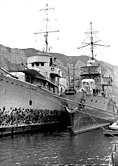Wikipedia:Main Page/Tomorrow
From tomorrow's featured article
Ljubljana was the third and last Beograd-class destroyer built for the Royal Yugoslav Navy in the late 1930s. She was designed to operate as part of a division led by Dubrovnik, the flotilla leader. Ljubljana entered service in November 1939, was armed with a main battery of four Škoda 120 mm (4.7 in) guns in single mounts, and had a top speed of 35 knots (65 km/h; 40 mph). In 1940, Ljubljana ran aground on a reef off the Yugoslav port of Šibenik, where, badly damaged, she was taken for repairs. Yugoslavia entered World War II when the Axis powers led by Germany invaded in April 1941, and Ljubljana—still under repair—was captured by the Royal Italian Navy. After repairs were completed, she saw active service in the Royal Italian Navy under the name Lubiana, mainly as a convoy escort on routes between Italy and North Africa. She was lost on 1 April 1943, when she ran aground and was abandoned off the Tunisian coast. (This article is part of a featured topic: Ships of the Royal Yugoslav Navy.)
Did you know ...
- ... that the name of the Japanese band Sajou no Hana (vocalist pictured) has no official meaning?
- ... that From Warsaw to Ojców, a 1897 Polish adventure and travel novel for young readers, was inspired by Jules Verne's works but reflects Polish patriotic and educational values?
- ... that a portrait engraver made the controversial decision to change a Sioux chief's war bonnet so that it would fit on the 1899 United States five-dollar silver certificate?
- ... that Charli XCX once followed George Daniel into a toilet but stopped halfway, and later wrote the song "Talk Talk" about the experience?
- ... that Rose O'Neill's marriage to Hugh Roe O'Donnell united two powerful noble families that had been rivals for centuries?
- ... that the practice of some Christians of making the lesser sign of the cross has been traced back to the 11th century?
- ... that Frederick Prigg and his predecessor as secretary of the Provisional Government of Oregon were both doctors who drowned in a river at Oregon City just three years apart?
- ... that a rainbow plaque marks the site of Peckham's Black Lesbian and Gay Centre?
- ... that one of the paintings sold by Beijing Hanhai was stolen by an emperor, and another was hidden in a well?
In the news (For today)
- Maia Sandu (pictured) is re-elected President of Moldova.
- In baseball, the Yokohama DeNA BayStars defeat the Fukuoka SoftBank Hawks to win the Japan Series.
- A canopy collapse at Serbia's Novi Sad railway station kills fourteen people.
- The ruins of a Maya city, dubbed Valeriana, are discovered in Campeche, Mexico.
- Duma Boko becomes the president of Botswana after the general election is won by the opposition Umbrella for Democratic Change.
On the next day
November 6: Gustavus Adolphus Day in Estonia, Finland and Sweden
- 1217 – King Henry III of England issued the Charter of the Forest, re-establishing the rights of access of free men to royal forests.
- 1863 – American Civil War: A Union brigade defeated a Confederate force at the Battle of Droop Mountain in Pocahontas County, West Virginia.
- 1917 – First World War: Canadian forces captured Passendale, Belgium, after three months of fighting against the Germans at the Battle of Passchendaele.
- 1988 – Two earthquakes occurring 12 minutes apart struck Yunnan near the China–Myanmar border, killing more than 730 people.
- 2012 – Tammy Baldwin (pictured) became the first openly gay politician to be elected to the United States Senate.
- Nasta Rojc (b. 1883)
- Jerry Yang (b. 1968)
- Emma Stone (b. 1988)
- Anthony Sawoniuk (d. 2005)
Tomorrow's featured picture

|
|
Cecilia Payne-Gaposchkin (1900–1979) was a British-born American astronomer and astrophysicist who proposed in her 1925 doctoral thesis that stars were composed primarily of hydrogen and helium. Her groundbreaking conclusion was initially rejected because it contradicted the scientific wisdom of the time, which held that there were no significant elemental differences between the Sun and Earth. Independent observations eventually proved she was correct. Her work on the nature of variable stars was foundational to modern astrophysics. Photograph credit: Science Service; restored by Adam Cuerden
Recently featured:
|
Other areas of Wikipedia
- Community portal – The central hub for editors, with resources, links, tasks, and announcements.
- Village pump – Forum for discussions about Wikipedia itself, including policies and technical issues.
- Site news – Sources of news about Wikipedia and the broader Wikimedia movement.
- Teahouse – Ask basic questions about using or editing Wikipedia.
- Help desk – Ask questions about using or editing Wikipedia.
- Reference desk – Ask research questions about encyclopedic topics.
- Content portals – A unique way to navigate the encyclopedia.
Wikipedia's sister projects
Wikipedia is written by volunteer editors and hosted by the Wikimedia Foundation, a non-profit organization that also hosts a range of other volunteer projects:
-
Commons
Free media repository -
MediaWiki
Wiki software development -
Meta-Wiki
Wikimedia project coordination -
Wikibooks
Free textbooks and manuals -
Wikidata
Free knowledge base -
Wikinews
Free-content news -
Wikiquote
Collection of quotations -
Wikisource
Free-content library -
Wikispecies
Directory of species -
Wikiversity
Free learning tools -
Wikivoyage
Free travel guide -
Wiktionary
Dictionary and thesaurus
Wikipedia languages
This Wikipedia is written in English. Many other Wikipedias are available; some of the largest are listed below.
-
1,000,000+ articles
-
250,000+ articles
-
50,000+ articles




